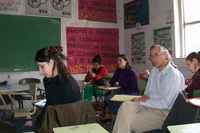The UPU at the ALAS Congress
Within the framework of the Latin-American Sociology Association that took place between August 13th and September 4th in Buenos Aires, the best-known member of the Urban Popular University (UPU), Alessio Surian and Cristina Reynals participated in the forum “Civil Society Organizations and knowledge production: Questions and challenges for Latin-America” .
The meeting was coordinated by Angelica De Sena (Methodology Lecture) FCS-UBA, same as Oscar Garcia, representative from the Universidad de San Martin, Eliane Ribeiro from Universidad Fluminense, Brazil, and Alejandra Moya, representing the Social Studies Center (CES); some participants outstood in the first round of input, such as Roxana Crudi, research teacher of the Social Exclusion and New Ailments Workshop FCS-UBA and facilitator in the II Regional UPU Meeting in Dominican Republic, Miguel Ojeda, member of the “Assembly for the recovery of the neighborhood”, of the Ejercito de los Andes neighborhood, who was a part of the first National UPU Workshop “Environment and Citizenship” in Ushuaia, and Bilma Acuña, president of ENAKORE town 15, CABA, who participated in both Regional UPU Meetings: Buenos Aires 2006 and Dominican Republic 2007, both members of the Environment Network of Argentina. And, finally, militants and leaders of different social movements and students of different nationalities, who were able to exchange experiences, also participated.
The forum began by posing this question: in the face of social science “bank globalized”, is it possible to think of other knowledge production spaces?
In this way, A. Surian started by stating the issues that arose when UPU was created, the idea of taking its own story, its own voice, and, at the same time, using it to create a knowledge which allows to question and boost the policies; also pointing out the transcendental importance of the training of leaders who can continue fighting .He also explained some aspects of the concrete practice of the knowledge production meetings that UPU organizes: the recurring stories about personal “clicks” that drove each of them to militancy, as the result of the accumulation of intellectual, but even more emotional, contents; and the double search that goes through them, the knowledge construction that allows to win struggles, and the continuous effort to improve oneself as producer. C. Reynals (UBA-UPU) told about the process that came after the creation of UPU, considering the actors that intervened in the first UPU Meeting, and she told how through exchange with FEDEVI, the leaders of Lima when they returned, created FOVELIC as an rising example from this process.
Thus a conductive thread of the interventions tending to challenge the definitions of civil society, the knowledge production as an activity, questioning the classic answers to the “for what”, for whom”, and “with whom” of knowledge, the role of the university academy, and the need to produce and question the social concepts that define the action, remembering that this are legitimable and legitimant at the same time.
The participations followed like so, first, R. Crudi, who stated the basic lineaments of the co-productive methodology, the importance of recovering the voices of the inhabitants as theoretical elements in the same conditions as the classic sociologists, and, furthermore, he told his personal experience, as A. Surian said, her own “click”, result of his academic work in the “neighborhood Ejercito de los Andes” He was followed by Miguel, who highlighted the fundamental role of pain in the production of knowledge, and how, only by recovering and taking care of it, can we manage to get over it. The intervention by B. Acuña circled around contemplating his academic experience as part of the society in which it is immersed, meaning, what someone added as an experience
.
Afterwards a short debate began, delimited by the congress times, around the production of knowledge as a right, its implications in the militant practice, and the relationships established by universities with social movements, which usually think of themselves as outside the society, being that they are nothing but another actor in the course of history.
Angelica was in charge of the closing where something fundamental was summarized; the need to move forward towards the democratization of the production and access to knowledge as a right, and as a mean to achieve a society with social justice, economic autonomy, and political sovereignty.


